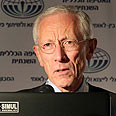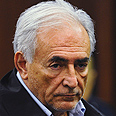

France's Christine Lagarde is the clear frontrunner to succeed Dominique Strauss-Kahn as managing director of the International Monetary Fund, a Reuters poll showed, even if she was not chosen as best suited for the job.
The survey of around 60 economists from all over the world revealed a strong expectation that Europe would retain its grip on the IMF's top job, after Strauss-Kahn resigned on Wednesday to face charges of sexual assault against a New York hotel maid.
Serving French finance minister Lagarde received over half the votes as "most likely" to succeed Strauss-Kahn – 32 of 56 – making her the overwhelming favorite, although far fewer picked her as "best suited" for the job.
That honor went to Stanley Fischer, the 67-year-old Bank of Israel governor and former IMF deputy managing director, who received 21 votes in his favor, compared to Lagarde's 10.
But both Lagarde and Fischer would face hurdles to any possible candidacy.
Over 26 of the past 33 years, the head of the IMF was French. That could hurt Lagarde's chances.
More importantly, she faces a possible inquiry into her role in awarding financial compensation to French businessman Bernard Tapie which could prevent her from taking on the role.
Still, the poll strongly favoured Lagarde.
"(Lagarde has) both the technical skills and the political passport. She's a name that, without a doubt, would not be bad for emerging economies," said Andre Perfeito from Gradual Investimentos, a brokerage in Sao Paulo, Brazil.
In Fischer's case, current IMF rules would seem to scupper his appointment outright, which state that persons 65 or over should not be made managing director.
That would also rule out others like Jean-Claude Trichet, the 68-year-old European Central Bank president.
"Fischer is perceived to be a capable leader, he has the resume, and he is generally well-liked," said Michael Woolfolk from Bank of New York Mellon.
After Fischer, former Bundesbank president Axel Weber received 11 votes for "best suited", followed by Lagarde with 10 and former British prime minister Gordon Brown with five.
Respondents were provided with a list of 8 possible candidates with an option to add their own.
Emerging chances
Even before Strauss-Kahn's resignation on Wednesday, emerging market politicians were touting their case for the IMF leadership. On Thursday, Turkish finance minister Mehmet Simsek said the practice of Europe appointing the IMF head must change.
The poll suggested they are likely to be disappointed, with only a scant expectation that emerging powers would finally see one of their representatives chairing the IMF.
Some 48 out of 57 analysts thought it was likely or highly likely the next IMF boss would be European.
Among emerging market candidates, Turkish central bank governor Kemal Dervis topped the list with six votes as "most likely" category and three votes as "best suited".
"Kemal Dervis would be an ideal compromise candidate as Turkey bestrides the two competing geographies of both 'more than half-way European' and 'somewhat still an emerging market'", said Alfredo Viegas from New Jersey-based Knight Capital Group.
Trevor Manuel, the South African finance minister, picked up a couple of votes as one of the few other emerging market possibilities mentioned by respondents.
The survey showed most analysts thought it unlikely that Strauss-Kahn's arrest would delay further measures for Greece, which on Tuesday received an IMF warning that it must redouble efforts to reform a debt-stricken economy.
Only 17 of 58 thought it would be "likely" or "highly likely" to delay talks with Athens.
"While Strauss-Kahn was an important political figure at the IMF, he was only one voice in policymaking," said Guy LeBas, strategist at Janney Capital Markets in Philadelphia.
"The IMF member countries have a far bigger voice in determining measures for Greece than Strauss-Kahn."
- Follow Ynetnews on Facebook















